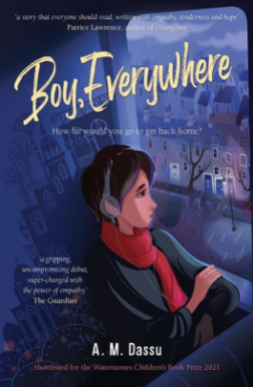It doesn’t matter that we don’t speak. There’s nothing to talk about anymore.
I approached this with the purest of expectations, I absolutely did. I knew I would be challenged – how could that not happen? – but I didn’t count on my heart being broken. A.M. Dassu’s Boy, Everywhere leaves me with pauses for reflection and thought of the utmost gravity – such that I count my blessings, and not just because I stumbled upon this book at random. I challenge you to read it and not arrive sobbing and drained at its conclusion.
One senses in the protagonist, 13-year-old Sami, an indomitable and playful spirit whose life in Damascus speaks of universal experience (‘they are also us,’ remember), FIFA computer games, schoolyard rough-and-tumble, mucking around with mates. And then, while on a trip to get Sami the footy boots he wants, his Mama and sister Sara get caught up in a bombing attack, and nothing will ever be the same again. Mama has seen enough and says they ‘can't wait until Damascus ends up like Aleppo’ survives, as does Sara, who has seen body parts and is then struck dumb for some time.
Once in England, Sami acts with some desperation in trying to get back to a country and a life which he knew and loved – but seeing how he is received by his Uncle Mohammed’s family, could you honestly say you would not taste that same desperation? Auntie Fatimah and cousin Hassan act with especial cruelty. For them, it seems the milk of human kindness is dispensed with a slow resentment. I recall with appalling clarity the fury with which Fatimah reacts to a tentative request from Sami that he borrow her laptop quickly to email his friends in the frantic hope they are still alive. How, were she to make the attempt, could she understand?
Agonising realisation dawns upon Sami while he struggles to assimilate it. Even when he meets Aadam – a slightly older lad – and they begin to talk cordially, opening up to one another, the seed of hope is still only miniscule. But, oh boy, does it bear glorious fruit. A foul aggressor, whom we know as ‘Air Jordans Man’, is ejected from their detention centre. And later in Manchester, Sami falls in with a most brilliant chap, Ali. Their friendship provides succour and respite while Baba and Mama juggle the necessities of finding work and dealing with an uncommunicative Sara.
Ali manages to get to a trust with Sami that allows the two of them to go to a burger bar. I imagined Ali’s nose may be put out of joint when, at the shop, who should also turn up but Aadam? Their reunion is a sudden and unexpected delight. Whilst we learn of the starkest privations Aadam has endured, it is to Ali's credit that he comes across as sanguine and well-adjusted. Suddenly, the seed of hope yields a veritable crop as the darkness is further leavened, by Sami's genius observation that where he now finds himself, ‘most men and women are dressed like they're going for a run but never do.’ I totally stood up from the book and applauded at this point.
There is so much more I want to tell you about Boy, Everywhere and so few words I have with which to adequately convey the impact of a most singular read. You will concur that ‘they’, as the author has said, are also ‘us’. You will be changed by this book. I mean this with the sincerest approbation.
One senses in the protagonist, 13-year-old Sami, an indomitable and playful spirit whose life in Damascus speaks of universal experience (‘they are also us,’ remember), FIFA computer games, schoolyard rough-and-tumble, mucking around with mates. And then, while on a trip to get Sami the footy boots he wants, his Mama and sister Sara get caught up in a bombing attack, and nothing will ever be the same again. Mama has seen enough and says they ‘can't wait until Damascus ends up like Aleppo’ survives, as does Sara, who has seen body parts and is then struck dumb for some time.
Once in England, Sami acts with some desperation in trying to get back to a country and a life which he knew and loved – but seeing how he is received by his Uncle Mohammed’s family, could you honestly say you would not taste that same desperation? Auntie Fatimah and cousin Hassan act with especial cruelty. For them, it seems the milk of human kindness is dispensed with a slow resentment. I recall with appalling clarity the fury with which Fatimah reacts to a tentative request from Sami that he borrow her laptop quickly to email his friends in the frantic hope they are still alive. How, were she to make the attempt, could she understand?
Agonising realisation dawns upon Sami while he struggles to assimilate it. Even when he meets Aadam – a slightly older lad – and they begin to talk cordially, opening up to one another, the seed of hope is still only miniscule. But, oh boy, does it bear glorious fruit. A foul aggressor, whom we know as ‘Air Jordans Man’, is ejected from their detention centre. And later in Manchester, Sami falls in with a most brilliant chap, Ali. Their friendship provides succour and respite while Baba and Mama juggle the necessities of finding work and dealing with an uncommunicative Sara.
Ali manages to get to a trust with Sami that allows the two of them to go to a burger bar. I imagined Ali’s nose may be put out of joint when, at the shop, who should also turn up but Aadam? Their reunion is a sudden and unexpected delight. Whilst we learn of the starkest privations Aadam has endured, it is to Ali's credit that he comes across as sanguine and well-adjusted. Suddenly, the seed of hope yields a veritable crop as the darkness is further leavened, by Sami's genius observation that where he now finds himself, ‘most men and women are dressed like they're going for a run but never do.’ I totally stood up from the book and applauded at this point.
There is so much more I want to tell you about Boy, Everywhere and so few words I have with which to adequately convey the impact of a most singular read. You will concur that ‘they’, as the author has said, are also ‘us’. You will be changed by this book. I mean this with the sincerest approbation.
Alex Hales is an occasionally amiable 47-year-old author of one screenplay, Unhappy Together, and five short volumes on matters such as music, verse, and nightlife. The most recent of these, Stagehands In The Night, was an affectionately-scurillous trawl through the ne’er-do-wells of his hometown that would benefit your spare time greatly.



